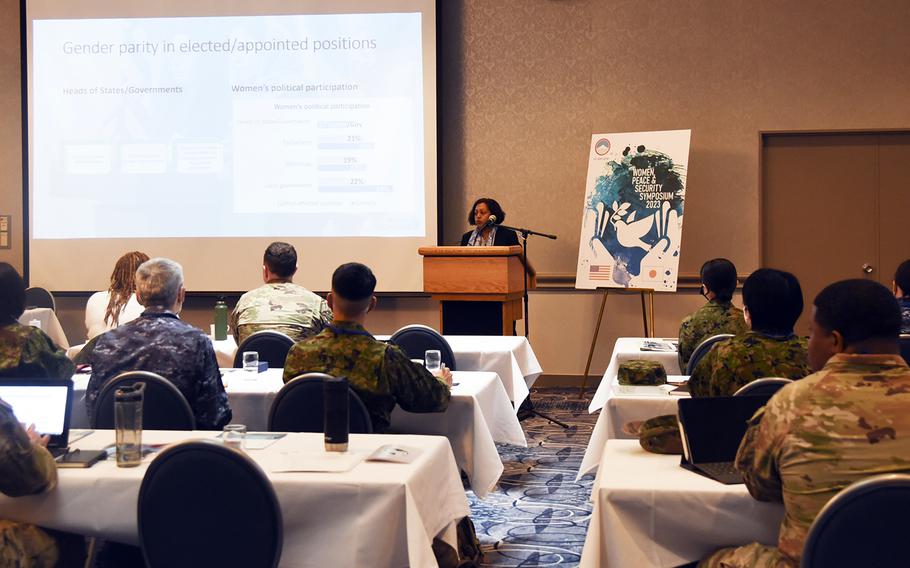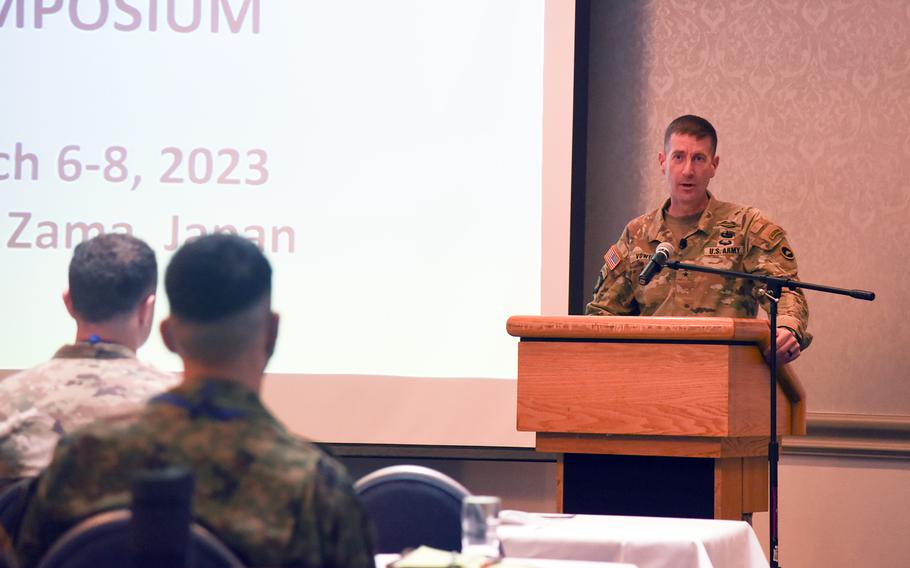
The Women, Peace and Security Symposium, held March 6-8, 2023, at Camp Zama, Japan, drew about 50 uniformed and civilian military professionals from the United States and Japan. (Kelly Agee/Stars and Stripes)
CAMP ZAMA, Japan — Maj. Gen. Joel Vowell, speaking this week at the Women, Peace and Security Symposium at the headquarters of U.S. Army Japan, recalled a real-life episode to illustrate how inclusivity works in a conflict zone.
Vowell, battling insurgents in Kunar province, Afghanistan, in 2010, met with local leaders — mayors, tribal elders, religious advisors — to learn their foremost needs. Those leaders, all men, agreed that access to fresh water was their biggest concern, Vowell said Monday during his address.
Meanwhile, female Army officers and noncommissioned officers meeting separately with Afghan women heard a different story. The women listed their priority as new textbooks and other materials for the local school.
“We learned that you sometimes get half the story in these official meetings, and I learned a very important lesson about being inclusive,” Vowell, the commander of U.S. Army Japan, told his audience. “This tactical example … brought to my mind how important it is to have a variety of thought in the room, diversity of background and being inclusive in all matters of national security.”

The commander of U.S. Army Japan, Maj. Gen. Joel Vowell, speaks during the Women, Peace and Security Symposium at Camp Zama, Monday, March 6, 2023. (Kelly Agee/Stars and Stripes)
U.S. Army Japan, for the first time, hosted the symposium Monday through Wednesday at the base Community Club. The event drew about 50 uniformed and civilian military professionals from the U.S. and Japan, including representatives from the Office of the Secretary of Defense, U.S. Indo-Pacific Command and Japan’s Air and Ground Self-Defense Forces. The U.S. 5th Air Force, III Marine Expeditionary Force, Naval Forces Japan and other commands were also represented.
The symposium focused on the role of women from the defense sector in maintaining global peace and security. The title is a misnomer, said panelist Erin Cooper, director of women, peace and security within global partnerships, strategic plans and capability at the Office of the Secretary of Defense.
“There seems to be a misconception sometimes [that women, peace and security] is only about women, and just women being able to participate in peace and security decision making,” Cooper said during a panel discussion. “When, in fact, taking a gender perspective is something that allows us to understand the various gender identity issues that might be a play, and how they could potentially impact military plans, operations and activities.”
Former President Donald Trump in 2017 signed into law the Women, Peace and Security Act, “the first legislation of its kind globally,” according to a Biden administration report to Congress two years later on progress implementing the act.
The act commits the United States to increasing women’s leadership in civic life and recognizing women’s roles in preventing and resolving conflict and building post-conflict peace and security, according to the report.
“Around the world, conflict and disasters adversely and disproportionately affect women and girls, yet women remain under-represented in efforts to prevent and resolve conflict, and in post-conflict peacebuilding or recovery efforts,” the report states. “Research has shown that peace negotiations are more likely to succeed, and result in lasting stability, when women participate.”
Japan is drafting its third national action plan for women, peace and security, and the U.S. is drafting its own strategy update, said Navy Lt. Cmdr. Andre Agraviador, a policy adviser at the defense secretary’s office of global women’s issues.
“We are interested in highlighting focus elements that Japan and the United States share such as disaster risk reliance, disaster risk resilience and working with the government of Japan,” he said.